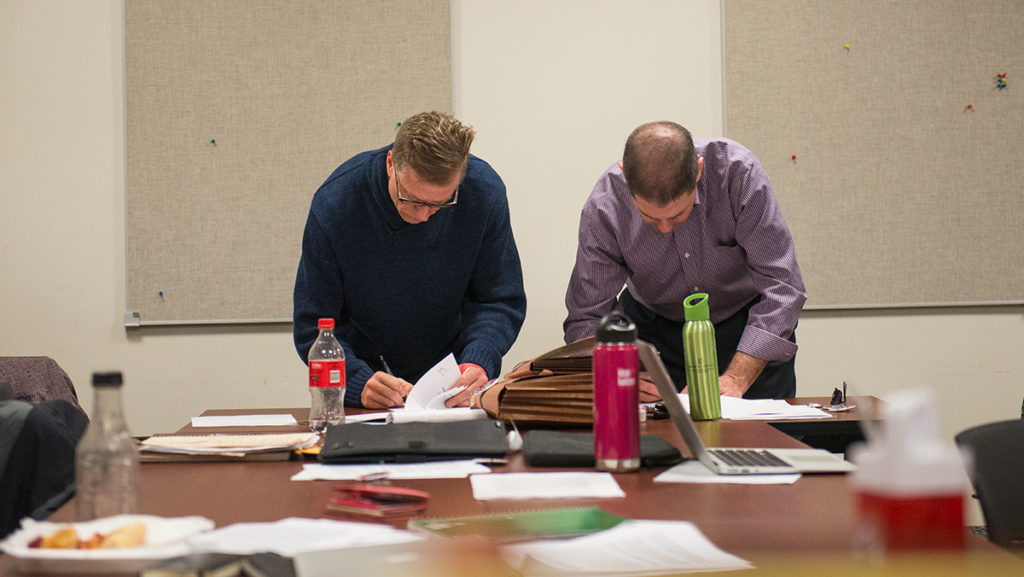The Ithaca College contingent faculty union is currently celebrating a victory it has been fighting to clinch for over 17 months: a first-time contract with the college. However, the campus community has expressed mixed reactions to the deal.
The contract, signed March 26, guarantees that part-time faculty will see a 24 percent raise over four years, bumping up the current three-credit course rate from $4,200 to $5,225. Additionally, part-time faculty have been awarded longer–term contracts: Those who have been working at the college for over three years will be eligible for a two-year contract instead of only semester-long contracts. Full-time faculty have also received longer–term contracts: After three years of working at the college, they will be eligible for a two-year–long contract, and after five years, they will be eligible for a three-year–long contract. And while many faculty members have recognized that this agreement will improve their lives at the college in some way, other faculty have concerns about the increased pay raise for part-time faculty and where the money will come from to fund it.
Harriet Malinowitz, lecturer in the Department of Writing, is one of the part time–faculty members who will be receiving over a $1,000 raise over the course of four years. Also, because she has been teaching at the college for three years, she is now eligible for a longer–term two-year contract through the new agreement, given that she is rehired for the Fall 2017 semester.
Malinowitz said the contract will help — the increased pay and job security will keep her more comfortable. However, the teaching she does at the college is not necessarily what’s keeping her financially afloat, as a retired lecturer with a pension. She said the faculty who do rely on teaching as their primary income will greatly benefit from the increased compensation and job security.
“There are two different types of part-time faculty,” she said. “I feel there’s the kind like me who don’t need this job to survive … but for me, it wasn’t for putting food on the table.”
Scott Stull, assistant professor in the Department of Anthropology, was planning on striking if an agreement had not been reached. He has worked for the college on and off for about eight years as a contingent faculty member. He said that based on what he knows about the deal, he feels very satisfied with it.
“I think the deal was exactly the thing that should have been offered by the administration way back when the negotiations began,” he said. “I think that the union and the faculty members got exactly what they were asking for. The reason that happened was because what they were asking for was entirely reasonable.”
Stull said he was told that he will not be rehired for next year, but a provision within the contract could give him a chance to be interviewed for a noncontingent full-time opening in his department for next year.
“If the union signs the agreement before the anthropology department search committee gets the job, then they’ll have to interview me even though I was not interviewed previously in the original round of candidates,” he said. “This is exactly why that is in the contract.”
However, some non–tenure eligible continuing faculty at the college have expressed that the rise in compensation for part-time faculty should come with extra responsibilities. Gossa Tsegaye, assistant professor in the Department of Media Arts, Sciences and Studies, said while he sympathizes with the contingent faculty and he is glad they were able to make progress in their contract, the raise the part-time faculty received should come with extra work.
“With that raise, there should be other responsibilities that come with it,” Tsegaye said. “Don’t compensate an individual unless you can redefine his role or her role in the system.”
Erin Francisco, lecturer in the Department of Writing, said she understands this criticism but that many contingent faculty have said they still do this extra work without having to be obligated. She said she has represented the college at a conference in the past but did not get compensated for this extra work.
Part-time faculty and full-time contingent faculty on one-year contracts are not contractually obligated to partake in service, scholarship and advising students, but non–tenure eligible continuing faculty like Tsegaye are, according to the faculty handbook.
Another concern surrounding the part-time faculty raise in compensation is how it will be funded. Kurt Lichtmann, lecturer in the Department of Health Promotion and Physical Education, is a part-time faculty member who would benefit from the pay raise; however, he said he takes issue with the raise because he was content with his pay before the negotiated rate and would rather the raise be invested back into his department.
Nancy Pringle, senior vice president for the Division of Human and Legal Resources and general counsel, said in an email that for the first two years of the compensation increase installments, tuition will not be raised to cover costs. For the last two years of the raises, she said, the raises will be employed “with minimal disruption to the overall tuition increase.”
While faculty may disagree on how the contract may best benefit them, Francisco said she thinks the added compensation for part-time faculty and job stability for everyone in the union will have a positive effect not only on individuals but on the entire campus.
“Overall, a lot of positive change is going to be felt across the contingent community,” she said. “And also, that will translate to, I feel, into the community at large and into the campus as well.”
Staff writer Ryan King contributed reporting to this article.








